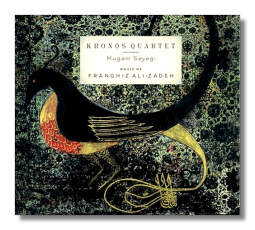
The Internet's Premier Classical Music Source
Related Links
- Latest Reviews
- More Reviews
-
By Composer
-
Collections
DVD & Blu-ray
Books
Concert Reviews
Articles/Interviews
Software
Audio
Search Amazon
Recommended Links
Site News
 CD Review
CD Review
Franghiz Ali-Zadeh

- Mugam Sayagi
- Oasis
- Apsheron Quintet
- Music for Piano
Kronos Quartet
Franghiz Ali-Zadeh, piano
Nonesuch 79804-2 DDD 61:35
Fans of Sofia Gubaidulina will enjoy the music of a woman composer from another one of the former Soviet republics. Franghiz Ali-Zadeh (b. 1947, although the booklet photograph makes her look much younger!) was born in Azerbaijan. Studying at the Baku Conservatory, she became a masterful pianist, and introduced fellow Azerbaijanis to progressive or even avant-garde music that was unknown in the republic at the time. She was a pupil of composer Kara Karayev, who urged her to take a more conservative route in her own compositions. (Soviet commissars were less interested in what was going on in Baku, however, than in Moscow and Leningrad.) Fortunately, she did not take his advice, and while she was in her twenties, she wrote in a style that reflected her interest in what was going on in the United States (Crumb, Cage, etc.) and in Western Europe (Messiaen, for example). Still she did not neglect her heritage, and the four works on this CD are a very attractive and convincing synthesis of Western innovation and experimentation, and Azerbaijani tradition.
The opening Oasis (1998), written for string quartet, starts and ends with the dripping of water. Later in the work, other extramusical sounds – mostly human in origin - are introduced. (It is not clear which of these are pre-recorded and which are "performed" by the Kronos Quartet.) Over the course of nearly 14 minutes, the four musicians paint a refined picture of desert starkness, with meaningful color added by Ali-Zadeh's "special effects". The music goes from pointillism, to anguished lyricism, back to virtual motionlessness. In the first part ("Tactile Time") of the Apsheron Quartet (2001), a violin imitates one of Azerbaijan's indigenous stringed instruments. The swooping and soaring melody, very Eastern in its melismatic cut, is punctuated and embellished by the other three string instruments and by the piano. The second part ("Reverse Time") echoes Bartók and Gubaidulina, and creates a Max Ernst-like atmosphere of wonder, mystery, and night terrors through the use of extended playing techniques, such as plucking the piano's strings. In terms of technique, none of this seems very new, but the combination of technique with the Azerbaijani sensibility is new, and very interesting.
Ali-Zadeh does solo honors for her Music for Piano (1989, revised in 1997). At the recording sessions, she "prepared" the piano by placing a beaded necklace she had been wearing across the piano strings. (The booklet note suggests this was done spontaneously.) The result is straight piano music accompanied by a fantastic rattling highly reminiscent of another indigenous Azerbaijani instrument, the tar.
Mugam Sayagi, written in 1993 for the Kronos Quartet, lends its title to the CD overall. An English translation might be "in the style of a mugam." (A mugam is a highly characteristic yet highly varied genre of Azerbaijani music, owing little or nothing to Western influences.) True to form, Ali-Zadeh's Mugam Sayagi contrasts two different style of music. One is contemplative. The other is militant, and, in its use a scale unfamiliar to Western ears, disorienting. At the time of its composition, Azerbaijan and Armenia were at war, and the music seems to mourn and protest the warfare in a way that Westerners will find both familiar and exotic.
As is usually the case, the Kronos Quartet has got the field to itself in this recording. Their belief in Franghiz Ali-Zadeh's music comes across as totally genuine, and their evocative performances follow suit. Ali-Zadeh has a powerful ally in the Kronos Quartet, and their performance together in the Apsheron Quintet is both a moving dialogue and a treasurable meeting of like minds. Fine engineering from Nonesuch, and a good booklet by Greg Dubinsky. This is one not to miss!
Copyright © 2005, Raymond Tuttle



















